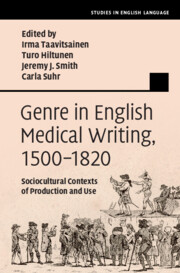Book contents
- Genre in English Medical Writing, 1500–1820
- Studies in English Language
- Genre in English Medical Writing, 1500–1820
- Copyright page
- Contents
- Figures
- Image Gallery
- Tables
- Notes on Contributors
- Preface
- Acknowledgements
- Chapter 1 Medical Discourse and Sociocultural Contexts 1500–1820
- Chapter 2 John Arderne’s Afterlife in Manuscript and Print
- Chapter 3 John Mirfield’s Gouernayl of Helþe
- Chapter 4 Surgical Handbooks Translated into Low German
- Chapter 5 Tracing the Early Modern John of Burgundy
- Chapter 6 The Plague in Southern Italy in 1815–1816
- Chapter 7 On Excitability
- Chapter 8 Systems and Centos
- Chapter 9 Medical Vocabulary in English Romantic Literature
- Chapter 10 Foreign Ingredients in Early and Late Modern English Recipes
- Chapter 11 Walter Bailey’s (1529–1593) Medical Genres
- Chapter 12 London Bills of Mortality of the Seventeenth Century
- Chapter 13 Advertising Proprietary Medicines in Pamphlets
- Chapter 14 Persuasion in Hungarian Medical Recipes
- Chapter 15 Persuasion in Early Modern English Medical Recipes
- Chapter 16 Richard III
- Chapter 17 Images and Paratexts
- Preface to the Image Gallery
- Image Gallery
- Index
- References
Chapter 6 - The Plague in Southern Italy in 1815–1816
Published online by Cambridge University Press: 13 October 2022
- Genre in English Medical Writing, 1500–1820
- Studies in English Language
- Genre in English Medical Writing, 1500–1820
- Copyright page
- Contents
- Figures
- Image Gallery
- Tables
- Notes on Contributors
- Preface
- Acknowledgements
- Chapter 1 Medical Discourse and Sociocultural Contexts 1500–1820
- Chapter 2 John Arderne’s Afterlife in Manuscript and Print
- Chapter 3 John Mirfield’s Gouernayl of Helþe
- Chapter 4 Surgical Handbooks Translated into Low German
- Chapter 5 Tracing the Early Modern John of Burgundy
- Chapter 6 The Plague in Southern Italy in 1815–1816
- Chapter 7 On Excitability
- Chapter 8 Systems and Centos
- Chapter 9 Medical Vocabulary in English Romantic Literature
- Chapter 10 Foreign Ingredients in Early and Late Modern English Recipes
- Chapter 11 Walter Bailey’s (1529–1593) Medical Genres
- Chapter 12 London Bills of Mortality of the Seventeenth Century
- Chapter 13 Advertising Proprietary Medicines in Pamphlets
- Chapter 14 Persuasion in Hungarian Medical Recipes
- Chapter 15 Persuasion in Early Modern English Medical Recipes
- Chapter 16 Richard III
- Chapter 17 Images and Paratexts
- Preface to the Image Gallery
- Image Gallery
- Index
- References
Summary
In 1815–16, the small town of Noja (now called Noicattaro), on the Adriatic coast of southern Italy, was affected by a plague epidemic, the last manifestation of this disease in Italy and one of the last in Continental Europe. Besides having serious demographic consequences at local level, the plague also had a considerable influence on medical and scientific debate concerning the nature of the disease and its feasible cures. In the first part, this study reviews some of the most significant doctrinal positions on the subject emerging within the southern medical profession. In the second part, it concentrates on the therapeutic strategies actually experimented with in Noja, highlighting the rejection of traditional pharmacopoeia and mainstream treatments such as emetics, purgatives, and bloodletting. Yet the medicines validated and tested as an alternative to these therapeutic modalities were at best palliatives, if not at times highly toxic substances. As a whole, the analysis shows how, when confronted with the plague, medical science continued to grope in the dark, despite wanting to free itself from traditional dogmas; the doctors' intervention on the epidemic certainly had negative effects on the course of the disease and on the trend of the fatality rate.
- Type
- Chapter
- Information
- Genre in English Medical Writing, 1500–1820Sociocultural Contexts of Production and Use, pp. 89 - 103Publisher: Cambridge University PressPrint publication year: 2022

